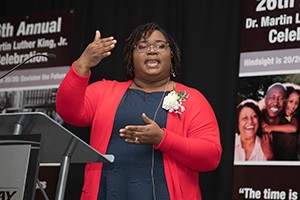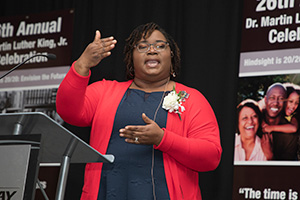More than 50 years after the Civil Rights Movement work of Dr. Martin Luther King Jr., America’s definition of family has changed, but Dr. King’s core message remains the same: We need to envision a world that empowers all children and families to succeed in society.
Providing a societal landscape to ensure families succeed was the focus of Katina Fuller-Scott, keynote speaker for Gateway Technical College’s 26th Annual Dr. Martin Luther King Jr. Celebration, held Monday at the college’s Madrigrano Center on its Kenosha Campus.
“When we speak about family and envision that our hindsight is 20/20, most of the times you are talking about lessons we have learned,” said Fuller-Scott, referencing the theme of this year’s event, Hindsight is 20/20: Envision the Future, which highlighted the importance of family.
“One of the things we’ve learned over the last 50 years is that family is constantly evolving. Dr. Martin Luther King spoke of family, but he also had a mother, father and children, correct? But we’ve evolved past that structure. We now have families which have been raised by grandparents. We have people who are raising children whose parents are incarcerated. We have families without children. We have families for foster care and we have adoptive families. The idea of family has extremely evolved – and that’s one thing we can celebrate today.”
Fuller-Scott, senior director of strategy, measurement and analysis for the Boys & Girls Club of Greater Milwaukee, said allowing youth to have a voice as part of a family’s dynamics leads to healthier families and children.
“Oftentimes, we speak about families from an autocratic standpoint: We are the adults, we know what’s best. But young people have something to say, too – what better place to be affirmed of that right than in their families?”
That creates safe spaces for youth to learn how to advocate for themselves in other instances, Fuller-Scott says.
“How do you create a space for each other to feel safe, physically and emotionally? How do we create a space for each other to feel like we belong to the foundation? You don’t have to earn a seat at the table – you have a right to be at the table. Our young people have a right to be at the table. We all have a right and that’s what makes us up.”
Fuller-Scott talked about the importance of empowering today’s youth, and that the family – no matter how it’s structured – is the first place where individuals can feel empowered. She also talked about the collective responsibility to help others, as Dr. King did, and the importance of starting those conversations.
“I read from a Dr. Martin Luther King speech, a sermon, talking about a conversation he had with his family. He said ‘As I go out and work, and I’m working to give my children the best education I could possibly get them, I always stressed to them that they should not think of themselves as more high, or better, than others.
“‘I always stressed that there are millions of people who will not have access to quality education. You cannot be who you truly ought to be until they are who they should be.’”
Gateway also honored this year’s Dr. King Humanitarian award winners, Deontrae Mayfield as well as the Kiwanis Club of West Racine.
In addition to the Humanitarian awards, Gateway honored more than 75 Dream Keepers – elementary, middle and high school students who were winners of the Peace Mentor, Kenosha Kindness Week and Peace Maker awards – at the event.
A link to a Gateway-produced video of the event can be found here: https://youtu.be/cLhQLmmCz7Q
A link to Gateway-produced photos of the event can be found here: http://bit.ly/GatewayKingCelebrate2020


